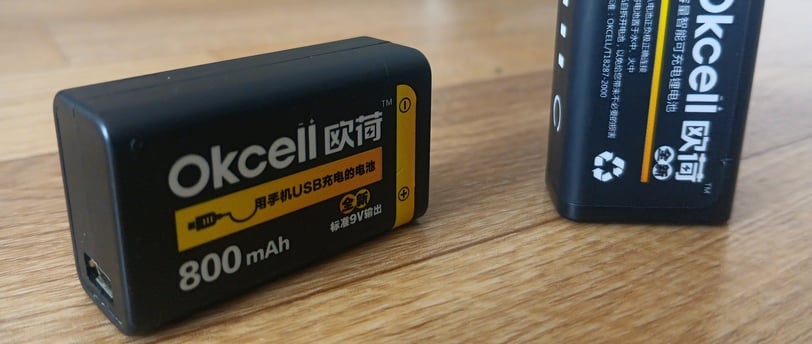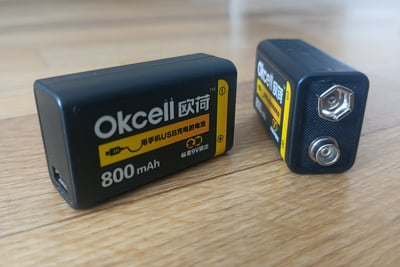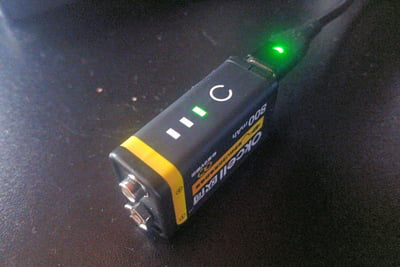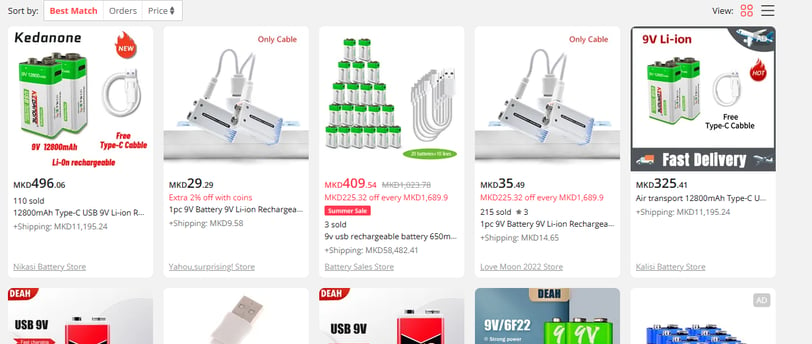USB Rechargeable 9V Batteries
Exploring some potential usage of USB Rechargeable 9V Batteries in Audio Production.
TIPS & TRICKS


Introduction:
During my never-ending quest to discover the latest and weird technology, I stumbled upon an interesting concept: USB rechargeable 9V batteries. Immediately, I recognized their potential for several practical applications. Although I currently lack professional audio equipment that necessitates 9V batteries for video production, I do own a collection of guitar pedals and effects that I prefer to use with 9V batteries. Let's see if incorporating USB rechargeable 9V batteries into your audio setup is a wise choice.
What exactly these devices are and how do they differ from our regular rechargeable 9V batteries? Essentially, they can be described as mini power banks disguised as 9V batteries. Unlike their conventional counterparts, these batteries provide a consistent 9V current until they are fully drained. Depending on the brand and model, they often feature an LED indicator to display the remaining capacity. The casing can vary from cheap plastic to sturdy metal alloys. And, of course, they all include the essential USB charging port for convenient recharging. Using the USB charging port eliminates the need to invest in a specialized battery charger for 9V batteries, making it a more practical choice. It's worth noting that battery chargers designed for regular 9V rechargeable batteries cannot be used with USB rechargeable 9V batteries.
While I haven't personally examined the internals of these batteries, my research suggests a common configuration. Typically, there is a small PCB board connected to LED lights and a charging port. Given the compact size of the 9V battery case, there isn't much space available for the lithium battery. Consequently, the expected capacity may not be very high. On average, these batteries tend to offer around 500mAh capacity, though different brands may market higher numbers. The actual capacity will depend on factors such as the brand's design and the quality of the lithium battery cells employed.
Where and How to acquire?
When it comes to purchasing USB rechargeable 9V batteries, it's worth noting that major battery brands do not currently offer this specific design. Instead, lesser-known companies dominate the market. These brands often lack dedicated websites and can be found on platforms like AliExpress, sold by various small shops. The limited information available makes it challenging to assess their trustworthiness. Alternatively, if you have the technical know-how, you can embark on a DIY project and build your own USB rechargeable 9V battery using your recycled lithium battery electronics. YouTube and electronic blogs can provide helpful guides for such projects and are relatively easy if you have some basic knowledge of electronics.
If you're considering purchasing USB rechargeable 9V batteries, exercising caution is crucial.
Watch out for exaggerated claims regarding battery capacity, as some sellers may falsely advertise unrealistically high figures like 12800mAh. As mentioned earlier, a realistic capacity for these batteries would be around 500mAh. Take time to browse through the comments section and look for trustworthy individuals who have already purchased and measured the battery's capacity. Show appreciation by giving them a like or supporting the platform they're on they deserve it. Additionally, be mindful of the shipping method and associated costs, especially for lithium batteries, as shipping fees can be substantial. Double-check the battery's compatibility with your desired USB charging port, preferably opting for one with USB-C, considering the current year is 2023. Lastly, ensure the seller has a reputable presence on the platform, and you can also utilize third-party apps like AliHelper for added confidence.






Usability:
In terms of usage, USB rechargeable 9V batteries can be employed just like any regular 9V battery. Simply plug them into your devices, and they will function as intended. When the battery is depleted, plug it into a standard smartphone charger to recharge and reuse it. The LED indicator is a convenient feature that allows you to gauge the approximate remaining capacity and plan your next recharge accordingly. However, it's important to note that since these batteries are not ordinary, certain devices may react differently to this alternative power source. Compatibility factors come into play, involving both the battery's internal electronics and the electronics of the device you're using. While the differences are not drastic, it's worth considering that using USB rechargeable 9V batteries in certain guitar pedals, for example, may introduce unwanted noise into the signal—a phenomenon absent when using regular 9V batteries.
Due to the small size of the case, their mAh capacity is generally lower compared to regular 9V batteries. Consequently, they require more frequent recharging. Additionally, it's important to consider the impact of cold temperatures on lithium batteries, as they tend to have reduced performance in such conditions. Moreover, over time and after numerous charge cycles, the capacity of lithium batteries may gradually decrease.
The market offers a variety of brands for these batteries, and it's important to note that each brand may exhibit slight variations in performance when used with different devices. While I cannot provide an assessment for every brand, I can share my personal experiences using them.
Conclusion:
Compared to regular batteries, USB rechargeable 9V batteries have significantly lower capacity, which diminishes further over time. When used with most audio devices, they may introduce undesired effects due to power distribution discrepancies. However, they offer the convenience of recharging with a standard smartphone charger and feature a handy LED indicator to check capacity. While they are relatively inexpensive, the overall practicality may be questionable.
Considering my personal experience, using them with guitar pedals proved futile due to the introduced signal noise, while using them with ordinary devices depleted the battery rapidly, requiring frequent recharging. Moreover, the process of researching and choosing trustworthy brands for these batteries can be a hassle. In my opinion, it's more practical to opt for a reputable charger and regular 9V rechargeable batteries from established major brands.
For professional audio and video production, I do not recommend using USB rechargeable 9V batteries. However, if you're seeking batteries for simpler applications like your grandpa's old TV remote, they can suffice, although you may find yourself recharging them every few weeks.
